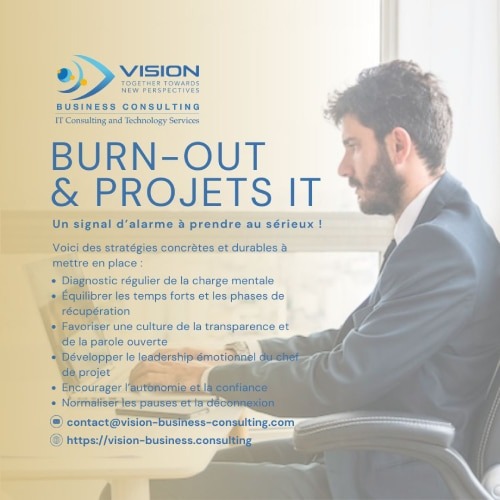
IT project managers operate in highly complex environments:
➡️ High client expectations
➡️ Often unrealistic deadlines
➡️ Simultaneous management of multiple deliverables
➡️ Constant pressure to deliver results
In this context, teams are on the front lines, increasingly exposed to burnout risks: physical exhaustion, mental overload, loss of motivation, emotional detachment… sometimes leading to full collapse.
🎯 The project manager’s role is no longer just about schedules — it’s also about championing team well-being.
💡 Here are concrete, sustainable strategies to implement:
🔹 1. Regular check-ins on mental workload
🧠 Too many meetings? Vague tasks? Lack of prioritization?
→ Run regular check-ins to identify early signs of overload before they become critical.
🔹 2. Balance intense phases with recovery time
📈 “Rushes” are part of the job — but they should be temporary, followed by quieter periods to recharge.
🔹 3. Foster a culture of openness and psychological safety
🗣️ Letting team members speak up about their limits without fear of judgment is essential.
→ Set up listening spaces: 1:1s, anonymous surveys, open retrospectives…
🔹 4. Strengthen the emotional leadership of project managers
💬 Emotional intelligence isn’t a luxury.
→ It helps detect unspoken issues, reassure teams, and motivate without relying solely on pressure.
🔹 5. Encourage autonomy and trust
⚙️ Empowered teams are more engaged.
→ Set clear objectives, then give freedom in how to reach them.
🔹 6. Normalize breaks and disconnection
🧘♀️ Working late isn’t a performance badge.
→ Create a culture that values work-life balance — even during intense project phases.
🔹 7. Support struggling team members
💡 Coaching, psychological support, task adjustments — act early when warning signs appear.
✅ A mentally healthy team is more creative, more productive… and more loyal.
Burnout isn’t something you fix at the end — it’s something you prevent daily through human-centered, respectful, and mindful management.
🔍 What practices do you put in place to sustain your project teams’ energy and motivation?
